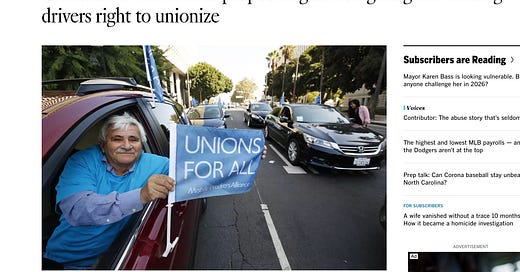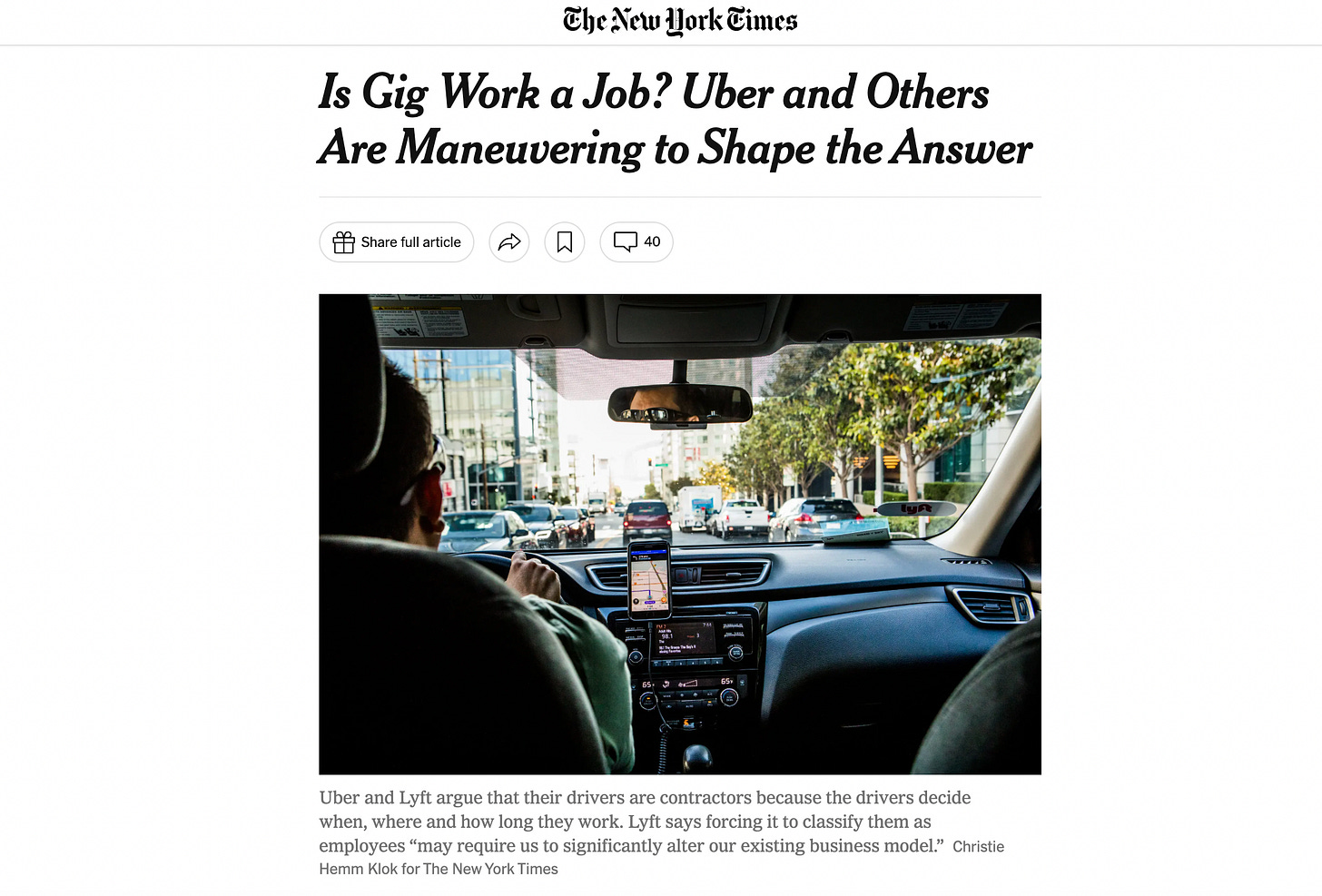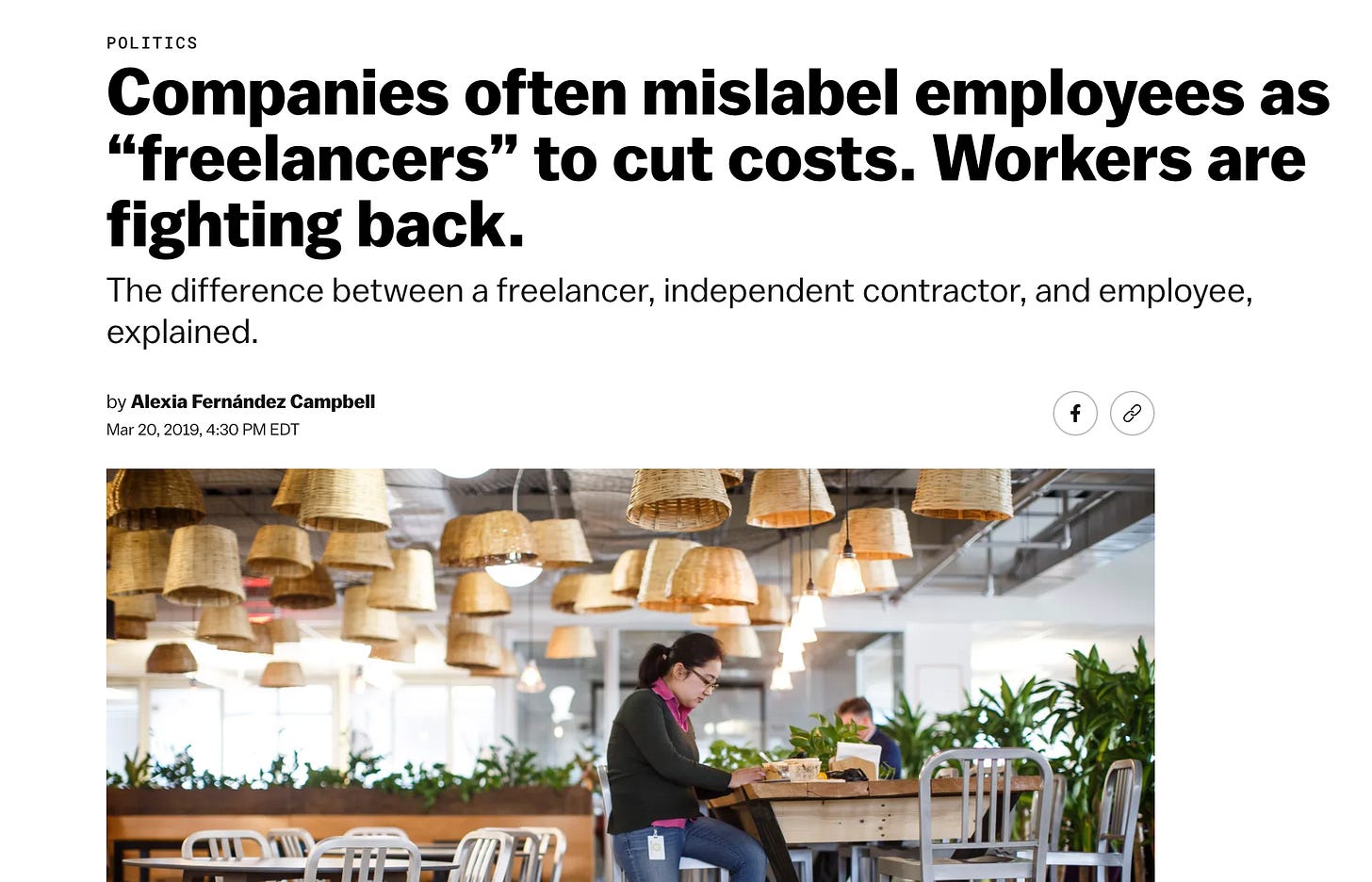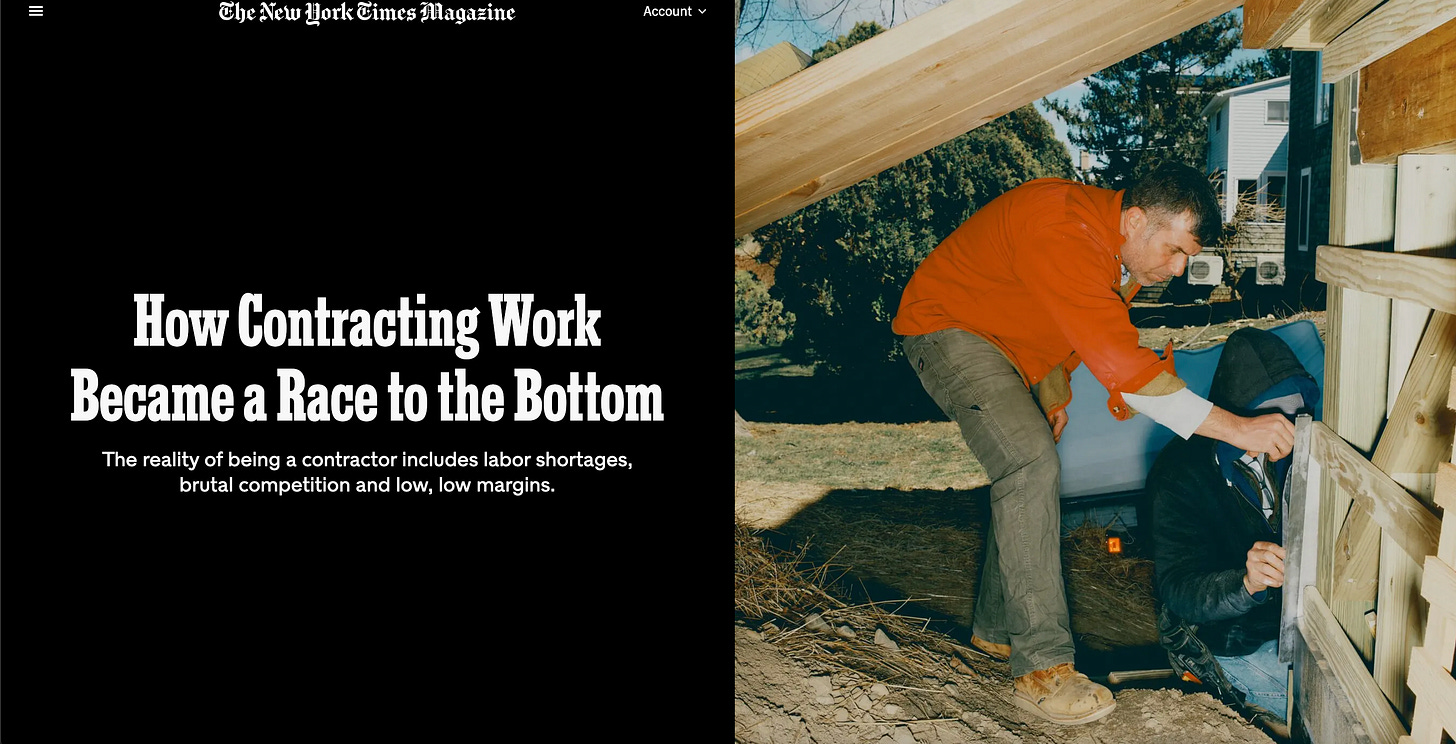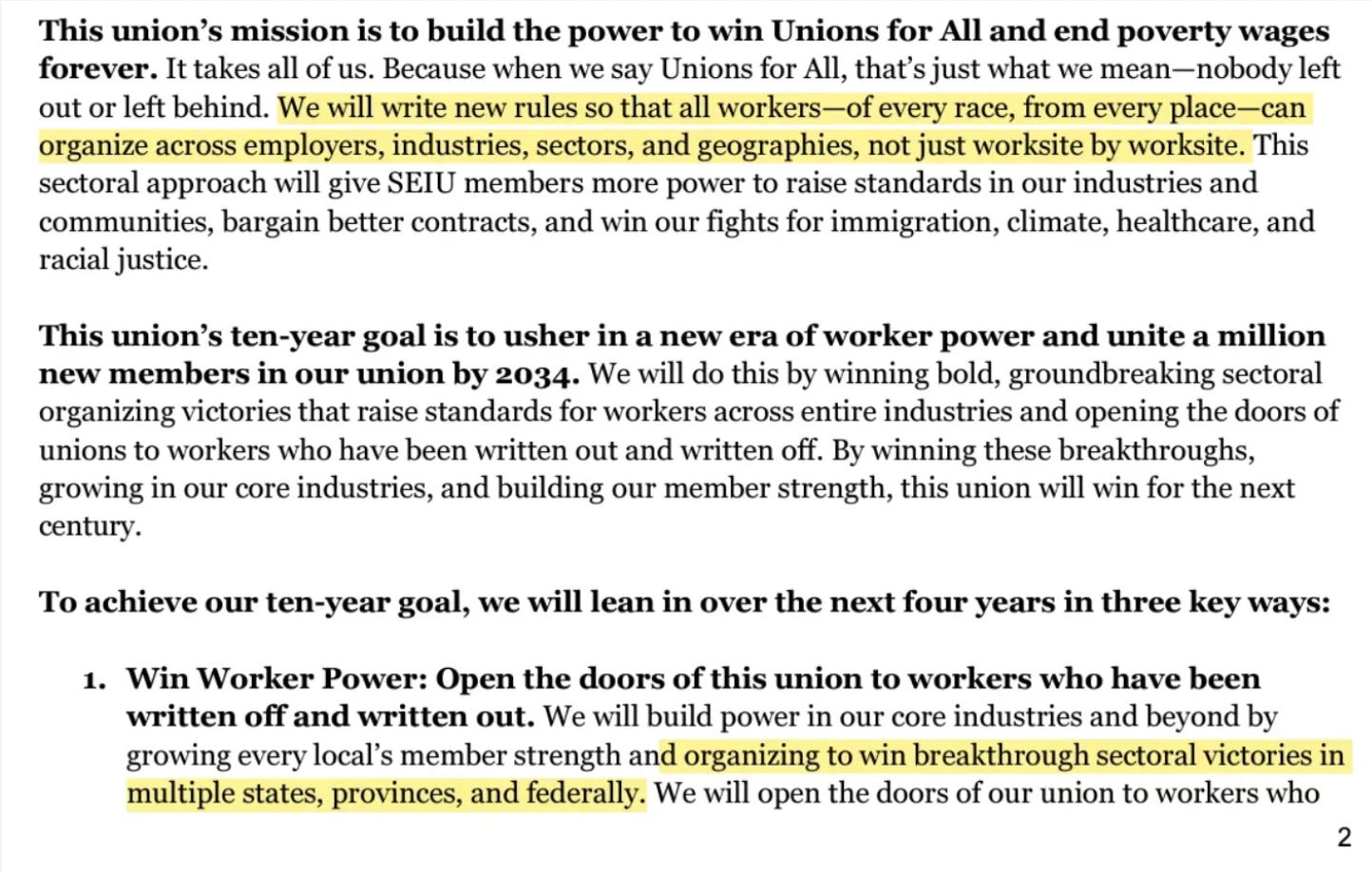Déjà Vu All Over Again
Reclassification attempts began with a media narrative, then blue-state legislation. The same thing is happening now with sectoral organizing.
On February 1, 2010, an article appeared in The New York Times describing a problem of employees being misclassified as independent contractors.
Less than a year later, Democrats introduced legislation in Congress, saying they wanted to close a tax loophole that lets businesses misclassify workers as independent contractors.
On March 26, 2019, this article appeared in The New York Times:
That same month, this story, which specifically cited misclassification among construction workers and janitors, appeared in Vox:
Two months later, in May 2019, the Protecting the Right to Organize Act was introduced in Congress, with Democrats saying it would crack down on independent-contractor misclassification.
In September 2019, California Governor Gavin Newsom signed Assembly Bill 5 into law, promising that it would reduce misclassification of independent contractors.
In November 2019, New Jersey Senate Bill 4204 was introduced, with sponsoring Senate President Steve Sweeney claiming it would protect “gig economy” independent contractors against misclassification.
In January 2020, Democrats in Congress insisted that House Speaker Nancy Pelosi bring the PRO Act to the floor for a vote, threatening the livelihoods of independent contractors everywhere.
Last Monday, this article appeared in The New York Times, focusing on the “problem of misclassifying construction workers” as independent contractors:
A day later, this article appeared in The Los Angeles Times:
Sigh.
The freelance-busting brigade’s playbook is beyond transparent at this point.
Union organizers want access to independent contractors. They want to operate outside the bounds of current laws that protect tens of millions of us who are happily self-employed beyond their reach.
In recent years, they have tried to access all of us self-employed Americans through a campaign seeking the widespread reclassification of independent contractors as unionizable employees. Their big-picture idea was that if governments simply outlawed our existing business relationships, then companies would create all kinds of new unionizable jobs, and independent contractors would take them.
It was a theory about as reality-based as a Smurf riding atop a flying dragon into Oz, but it worked for them in California. In 2019, the freelance busters got Assembly Bill 5 into law there.
Attempts to copy it have since failed everywhere else, in large part because of the destruction of Californians’ incomes and careers that followed AB5’s passage.
Now, this same freelance-busting brigade is back with the same playbook it used at the start of its push for widespread reclassification. Only this time, the laws these deeply misguided people hope to enact would not reclassify independent contractors as unionizable employees.
Instead, their new idea is to create state-backed union influence over entire sectors of the U.S. workforce at once—including sectors where independent contractors do business—through a method called sectoral organizing.
The Playbook
Here’s the freelance-busting brigade’s four-step playbook. One of its hallmarks is the kind of media coverage we saw last week in The New York Times and Los Angeles Times:
Use liberal-leaning media to make people think you’re trying to help downtrodden independent contractors who desperately need protection—particularly Uber drivers, janitors or construction workers—by benevolently “giving” them new rights to unionize. Always frame the legislation as a gift, as opposed to an attack on the fundamental freedom to be our own bosses that has existed since the day the United States was founded.
Make no mention of the fact that Gallup shows 80% of Americans either do not wish to join a union, or are at best neutral on the subject. Never reveal research showing that 77% of app-based workers wish to remain independent contractors. Do not cite Gallup research showing most Americans want to be their own bosses. And never, ever acknowledge federal government data that shows 80% of independent contractors prefer to be self-employed.
Never reveal that Big Labor plays a role similar to Big Tech or Big Pharma in supporting the political campaigns of lawmakers—Democrats in particular. Do not include data about union membership being at an all-time low, and omit data about independent contracting being at an all-time high. Never show the clip from Congress of a Democratic Party witness testifying that “gig economy” workers should be reclassified as unionizable employees against their will. Omit data showing that construction unions, in particular, are hemorrhaging members.
Introduce legislation in liberal-leaning states, and with strong support from the Democratic Party in Congress, that would give union organizers unprecedented access to independent contractors of all kinds. Always target the most liberal areas and voters because of strong liberal political bias outside the norm of what most Americans, and most independent contractors, believe to be true about self-employment.
Tuesday’s Los Angeles Times story, to the average person reading it, would provide zero indication about the true nature of what is being proposed now in California. The Los Angeles Times made the concept of creating government-backed union influence over entire sectors of the economy seem as ho-hum as unwrapping a piece of chewing gum, and as limited as possible to rideshare drivers alone.
Per the article:
“California lawmakers are pursuing legislation that could give drivers for apps like Uber and Lyft the ability to form unions, while still being classified as independent contractors. …
“The California proposal is similar to a ballot initiative approved by Massachusetts voters in the fall that was also backed by the Service Employees International Union — as well as the International Assn. of Machinists and Aerospace Workers.”
Would you know, after reading that description, that the plan is to change the law in a way that would be a radical departure from how unionization has always worked in the United States in the past? Would you realize that this plan could ultimately give unions a legal foothold to gain the same kind of influence across all kinds of economic sectors nationwide?
Of course you wouldn’t—because that would not be a winning sales pitch for the freelance-busting brigade. Giving Uber drivers rights sounds a lot better.
And make no mistake: What was published as “news” last week was a practiced sales pitch. Just one month ago, the freelance-busting brigade tested out this same exact sales pitch in Minnesota. After first trying it in autumn 2024 in Massachusetts.
In Minnesota, the bill’s sponsor said this, also omitting any details about the true scope of what he was proposing:
“Unions are the backbone of America … Big rideshare companies continue to do the bare minimum while making billions. It is time for change. This bill will give drivers the right to form a union and negotiate fair pay and protection … We are following the model that worked in Massachusetts. We will try to implement the same model right here in Minnesota.”
For the record, there is no “model that worked in Massachusetts.” The freelance-busting brigade got a ballot initiative to squeak through with 54% of the vote less than six months ago. It is still unclear to everyone what, exactly, it will mean.
Don’t take my word for it. Even the pro-union publication On Labor describes what’s happening in Massachusetts right now as being iffy at best. From an article that On Labor published just last week:
“But as other states consider laws modeled on Question 3, the Massachusetts law is still in an experimental phase.”
This reality is irrelevant to the freelance-busting brigade. These same people are now barreling forward once again in their efforts to gain access to independent contractors of all kinds. They are once again claiming it’s mainly about Uber and Lyft, just as they tried to convince us all that it was mainly about Uber and Lyft back in 2019—when they actually worked toward imposing a law that affected independent contractors in more than 600 professions.
The only differences between then and now are that this time, the strategy’s original launch state is Massachusetts instead of California, and that the freelance busters’ new goal is sectoral bargaining instead of widespread reclassification.
This is Still About Control
As one attorney from a top labor and employment law firm explained it, what’s happening in Massachusetts—and what the freelance busters are trying to spread elsewhere now—“is literally unprecedented.”
In the United States, unions not only have to leave independent contractors alone, but when it comes to unionizing traditional employees, they are legally required to organize only a single company, or subset of a company, at a time. For instance, union organizers can’t get access to the whole auto industry at once; they first have to get some employees at Ford to unionize, then go to Chevrolet, and so forth. Every employee gets a vote on whether to join the union. In legal lingo, unions have to focus their organizing efforts on a single enterprise at a time.
Sectoral organizing is different from enterprise organizing. With sectoral organizing, the one-enterprise-at-a-time limitation is removed. Unions could gain influence over setting standards for entire industries at once—including the hundreds of industries where independent contractors do business, even without reclassifying us as employees.
Yes, what’s happening right now in Massachusetts, Minnesota and California is legislation specifically about the rideshare industry—but the freelance-busting brigade’s real goal is to legalize the concept of sectoral bargaining so they can ultimately impose it on everyone.
The Service Employees International Union said so itself, in April 2024:
They’ve been thinking for a long time about this strategy shift away from reclassification and toward sectoral organizing.
Consider this 2021 article from the socialist publication Jacobin that shows the direct line of thinking. This article starts out by praising the federal PRO Act—which would have imposed California-inspired reclassification on independent contractors nationwide—and then goes on to say that if the PRO Act can’t get through Congress (which, thankfully, it hasn’t), then another option is sectoral bargaining:
“Even without the substantial legal reforms to freedoms of speech and association at work offered by the PRO Act, workers and their unions can always control their organizing strategy …
“Internationally, other labor movements have won alternative legal systems of labor relations. In particular, strong labor organizations have won sectoral bargaining in several different forms …
“Sectoral bargaining now exists in Europe (particularly Northern and Southern), Argentina, Brazil, and Uruguay. Systems of sectoral bargaining produce large differences in union density and union coverage rates. For example, only 8 percent of France’s workers are union members but 98 percent of workers are covered by union contracts…”
Think about that philosophy and what it would mean for independent contractors in the United States.
Right now, we have the freedom to be our own bosses, to choose which projects we take on, to negotiate our own contracts, and to control our own working conditions. A lot of us are earning a solid living this way, according to a recent report from MBO Partners, which also showed what other reports have found to be true about independent contractors going back years now. Many of us are, quite simply, happier and healthier than traditional employees who can be unionized.
The fundamental problem that the freelance-busting brigade ran into with its attempts to reclassify us all as unionizable employees in recent years is the same fundamental problem they’re going to crash into now with sectoral bargaining: They’re trying to do something by government-backed force that most Americans do not wish to do voluntarily.
With reclassification attempts, even in the bluest of states, we have seen grassroots backlash, lawsuits challenging the freelance busters, and independent contractors asking Congress again and again to protect us from them.
Expect all of this to start all over now with respect to sectoral organizing, just as soon as Americans figure out what’s really going on behind the Uber and construction headlines.

